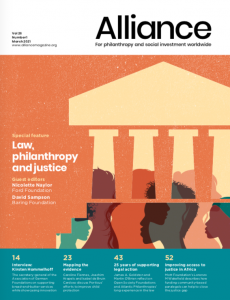Nearly 4 million hours of legal pro bono were completed globally last year, with lawyers dedicating an average of 26.3 hours of their free expertise each year, research from TrustLaw, the Thomson Reuters Foundation’s global pro bono legal programme, has found. The matters handled pro bono in 2020 ranged from access to justice, economic development and microfinance to human rights, women’s rights, the environment and climate change.
The research is available in the 2020 TrustLaw Index of Pro Bono, which was compiled over a twelve-month period, with data from 215 law firms representing 150,000 lawyers in 91 countries. The Index aims to provides a snapshot of key national, regional and global trends shaping the pro bono marketplace, and illustrates a story of global growth and commitment to pro bono legal assistance during one of the most challenging years in recent history.
‘In an era where three global crises converge – health, economic and environmental – maintaining and growing the pro bono support of leading law firms and corporate legal departments around the world has never been more critical for NGOs and social enterprises on the frontlines of social change,’ said Antonio Zappulla, CEO of the Thomson Reuters Foundation.
‘The Thomson Reuters Foundation has long championed the practice of pro bono; scaling and developing the sector has been core to the work of TrustLaw, our pro bono legal network – now the largest in the world. We hope this index provides law firms with the information they need to create the right infrastructure for robust and sustainable pro bono practices and to achieve the greatest impact from their pro bono work.’
Data from the Index shows that the practice of pro bono is continuing to spread beyond the realm of traditional pro bono markets and global law firms: the US, UK and Australia.
- The Americas saw firms nearly double the average amount of pro bono performed since 2016.
- Submissions from firms in Africa and the Middle East nearly tripled, and Nigeria stood out with one of the highest global averages of pro bono hours per fee earner, indicating a strong culture of pro bono in Africa’s largest nation.
- Europe’s pro bono culture continues to thrive, boosted by the region’s inaugural launch of the European Pro Bono Week in 2019, organised both by law firms and non-profits.
- In the Asia-Pacific region, some countries continued to further embed pro bono infrastructure into their national legal practice systems, while others saw lawyers respond in large numbers to human rights crises.
Since the launch of the TrustLaw Index of Pro Bono in 2014, it has become a repository of information on the global pro bono sector, uncovering emerging trends and quantifying the complex ways in which the sector is evolving.
‘The Index illustrates a story of global growth and commitment to pro bono legal assistance to help drive the social and environmental change that is so critically needed across the globe during these challenging times,’ said Carolina Henriquez-Schmitz, Director of TrustLaw, Thomson Reuters Foundation.
In addition to its pro bono legal services, TrustLaw also provides legal research and training courses worldwide.
Upcoming issue: Law, philanthropy and justice
 Legal action has a significant contribution to make to achieving social change and covers a huge range of fundable activities. These include widening access to justice, supporting public legal education, investing in the next generation of activist lawyers and helping human rights defenders and climate activists. Yet only a small part of organised philanthropy has a specific strategy for legal action and many funders are cautious about working in this area. This issue will explore new ways for funders to reimagine justice and debate effective strategies for contemporary philanthropic engagement in and with the law. Guest edited by Nicolette Naylor, Director of the Southern Africa office of the Ford Foundation and David Sampson, Deputy Director, Baring Foundation, UK.
Legal action has a significant contribution to make to achieving social change and covers a huge range of fundable activities. These include widening access to justice, supporting public legal education, investing in the next generation of activist lawyers and helping human rights defenders and climate activists. Yet only a small part of organised philanthropy has a specific strategy for legal action and many funders are cautious about working in this area. This issue will explore new ways for funders to reimagine justice and debate effective strategies for contemporary philanthropic engagement in and with the law. Guest edited by Nicolette Naylor, Director of the Southern Africa office of the Ford Foundation and David Sampson, Deputy Director, Baring Foundation, UK.
Subscribe today to make sure not to miss it!





Comments (0)